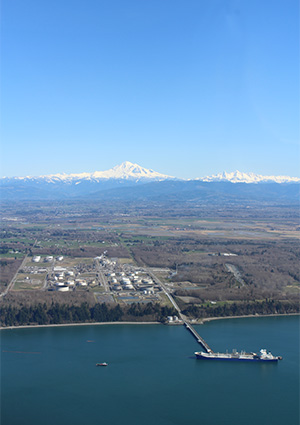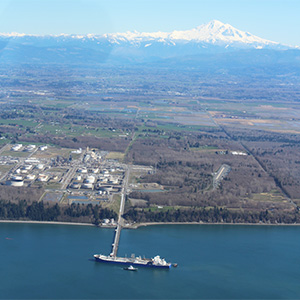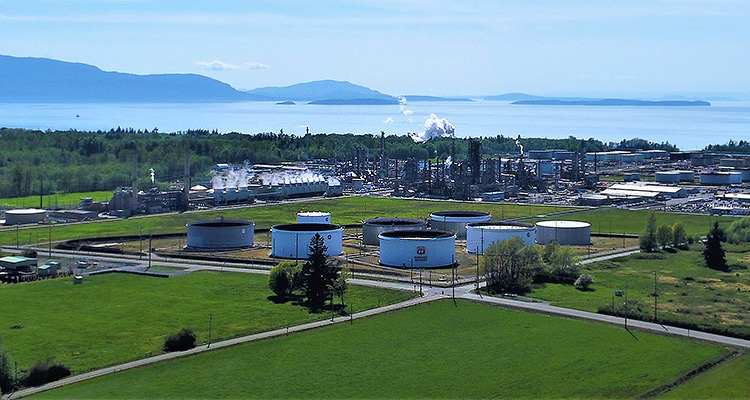Carl Perkins shares his fervor for the future of energy and how the Ferndale Refinery is helping the world move forward
I’ve been with Phillips 66 for about 33 years,” begins Carl Perkins, General Manager, Ferndale Refinery. “I started my career in Oklahoma, and I’ve worked at many refineries across Texas, Louisiana, California, Montana and Washington. Ferndale produces approximately 105,000 barrels per day. It receives crude by pipeline out of Canada, by rail out of North and South Dakota, and then by ship from around the world.
“Our traditional gasoline diesel products are sold to the local market. Our region encompasses Washington, Oregon, California and all the way down into Latin America as well. We have a wide assortment of different fuel types, and as you can imagine, what’s required for Canada is not the same as Latin America. We have about 285 employees at the site and approximately 200 contractors. There are five refineries in the Pacific Northwest, and Ferndale, while not the smallest, is on the smaller side of the five. That said, our operations are extremely efficient and we’re doing well,” he elaborates. 
The Ferndale Refinery is located on Puget Sound in Ferndale, Washington, approximately 20 miles south of the US-Canada border. Facilities include crude distillation, naphtha reforming, fluid catalytic cracking, alkylation and hydrodesulfurization units. The refinery produces a high percentage of transportation fuels. Other products produced include residual fuel oil, which is supplied to the northwest marine bunker fuel market. Most of the refined petroleum products are distributed to customers in the northwest United States by pipeline and barge.
Phillips 66 is evaluating ways to increase lower-carbon hydrogen use in its operations. One example is a project to produce and supply green hydrogen to the Ferndale Refinery and reduce the carbon intensity of its fuels. Green hydrogen, a nearly GHG emission-free fuel, is created through electrolysis using wind or solar electricity and water.
“We are currently in construction,” Carl shares. “We are in the civil phase of the foundations and bringing the electrical infrastructure over for that project. We’re planning on commissioning this green hydrogen plant early next year, in 2025. We’re also currently importing renewable diesel from our Rodeo Renewable Energy Complex in the East Bay of San Francisco and distributing that out to the local market. We’ve been doing that since early 2024 and it’s increasingly successful. We’re also evaluating blending some of the renewable jet fuel from that same facility with traditional crude to produce sustainable aviation fuel. That project is currently being reviewed and would primarily be a piping project with a couple of small filtration processes to clean the fuel for the final product specification.
“Our plan is to start construction on the piping associated with that job later this year and then next year, bring that renewable jet fuel from the Rodeo Renewable Energy Complex up here to Washington. While we’re already very energy efficient, there are always opportunities for improvement. We’re exploring replacing some steam driven equipment with electric motors. Our power is primarily renewable energy and so converting steam driven equipment will generate a further reduction in emissions. We’re also recovering energy that is currently being lost and using it to heat processes, thereby reducing firing on some of our natural gas fires. So, we have several projects that are focused on the sustainable portion of our business, which is critical to Phillips 66’s overall operations,” he elaborates.
Emissions reduction
Phillips 66 takes a strategic approach to sustainability and human capital management which includes a focus on operating excellence, minimizing impact on the environment, developing a high-performing organization and engaging with stakeholders. The company has made meaningful progress towards developing a lower-carbon business plan based on achievable targets and thoughtful strategy.
“The organization is committed to supporting the Paris Agreement and being part of the solution to help the world address climate change,” Carl continues. “Our technology developments and deployments are needed to provide energy today and to achieve energy transition goals. In 2021, we committed to reducing our Scope 1 and 2 emissions by 30 percent by 2030 based on our 2019 position. Three years later, we are halfway to those targets. We also committed to a 15 percent reduction target for our Scope 3 emissions and are again halfway to achieving that goal.
 “We’re also looking to increase those reductions by a further 20 percent; to achieve 50 percent by 2050. Our mission is ‘Providing energy and Improving lives’. This includes everything we do at our facilities and in the communities in which we operate. In the last decade, we’ve donated over $310 million to our communities, and that trend continues today. As well as donations of money, our company invests time and supports employee volunteerism.”
“We’re also looking to increase those reductions by a further 20 percent; to achieve 50 percent by 2050. Our mission is ‘Providing energy and Improving lives’. This includes everything we do at our facilities and in the communities in which we operate. In the last decade, we’ve donated over $310 million to our communities, and that trend continues today. As well as donations of money, our company invests time and supports employee volunteerism.”
Focus pillars
Good Energy is Phillips 66’s employee volunteerism program and was designed to inspire employees to connect with neighbors and share compassion, talents and hard work to improve communities. Through volunteerism, the company seeks to create community connections that inspire action, identify solutions to society’s greatest challenges and improve lives.
“For the remainder of the year,” Carl elaborates, “Our priorities are in alignment with our company vision of being the leading integrated downstream energy provider and with our refinery strategy of being a world class operation. We have five pillars of focus moving forward. One is maintaining our excellent health, safety, and environmental performance. Another is supporting the development of our people and having open conversations so that they know what their future careers could look like. Our third pillar is around reliability and being able to supply energy to the local market when we need to. We will also be focusing on our margin and improving our earnings per barrel; looking at how we can produce premium products and sell them at the right location. Our fifth pillar will be to work on cost reduction. We’ve been going through a business transformation effort at the company over the last couple of years. As such, our focus for the remainder of the year is to continue to work on cost reduction activities while maintaining the great asset we have,” Carl enthuses.
Looking to the future for Ferndale, Carl shares that over the next five years, the plan is to balance building out the company’s renewable footprint with the need to maintain affordable fuel for customers, alongside reducing the energy consumed for every barrel processed. “Additionally,” he concludes, “I can share that I will be moving to Phillips 66’s Ponca City Refinery in Oklahoma and Kevin Schmidt will take the reins here, as General Manager of the Ferndale Refinery.”
